At a meeting to celebrate the 40th anniversary of reform and opening-up held at the Great Hall of the People in Beijing on 18 December last year, the Central Government commended 100 people who have made outstanding contributions to the country’s reform and opening up. Among the five from Hong Kong and Macau who were commended, three were the Chamber’s previous Chairmen; they are K C Wong, Henry Fok and Tsang Hin-chi, providing evidence of the outstanding contributions made by the Chamber’s members through their active participation. With the new phase of reform and opening-up kicking off a new era for the country’s economy, the Chamber will continue to play an active role for the motherland.
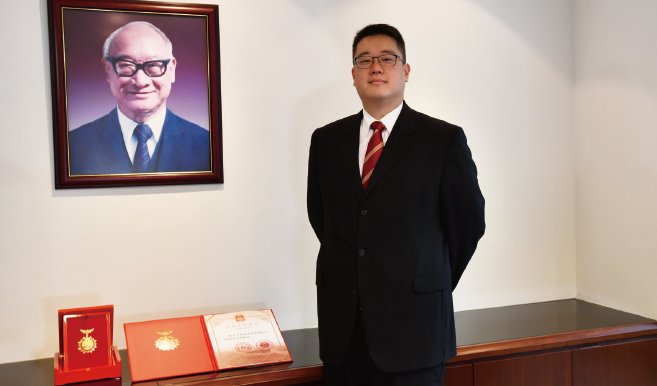
KC Wong: A pioneer of Mainland visits
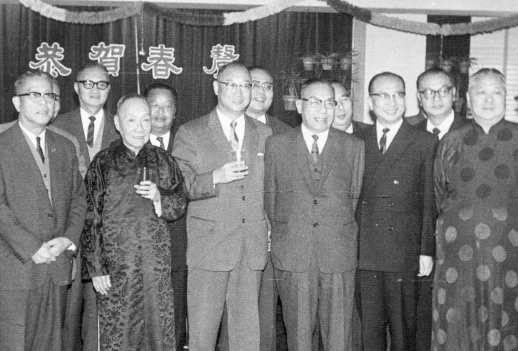 The opening of the Guangzhou-Shenzhen-Hong Kong high-speed rail has made the idea of a one-hour life circle in Guangdong and Hong Kong come true. The convenience of transportation today seems to be a matter of course, but it would be unbelievable for people dozens of years ago. One example is Chairman K C Wong’s three-month visit in the Mainland in 1949. His first stop to Qingdao was by ship.
The opening of the Guangzhou-Shenzhen-Hong Kong high-speed rail has made the idea of a one-hour life circle in Guangdong and Hong Kong come true. The convenience of transportation today seems to be a matter of course, but it would be unbelievable for people dozens of years ago. One example is Chairman K C Wong’s three-month visit in the Mainland in 1949. His first stop to Qingdao was by ship.
Personal Mainland visits and promotion of four modernizations
K C Wong has passed away for more than 30 years. As his descendant, Laurence Wong, the Chamber’s Standing Committee Member, was filled with emotions when recalling his grandfather’s lifelong accomplishments: “My grandfather’s heart was with the Motherland all long, so going north for a visit in person had always been in his mind.” He admitted that the public’s understanding of China in the past could only come from piecemeal media reports. It was precisely this that drove K C Wong to become a pioneer of visits to the Mainland at the beginning of the country’s founding. The trip lasted three months, with K C Wong stepping foot in Qingdao, Jinan, Tianjin, Beijing, Shenyang, Dalian and Shanghai. He later captured his experience in an article Sights and Sounds from a Trip to the North published in Hong Kong’s Ta Kung Pao in early 1950. "Although my grandfather modestly claimed that what he gained was just a superficial understanding from cursory observation, his writings were very detailed.”
K C Wong served as the Chamber’s chairman for several terms from the 1960s to the 1980s. During his tenure, he strived for the establishment of the China Four Modernizations Service Committee to provide support for China’s efforts in its four modernizations in Hong Kong. Laurence added that his grandfather organized a number of delegations to encourage members to gain insight into the new China’s development potential and to pave the way for members to communicate with Mainland cadres, fully playing the Chamber’s role as a bridge. It is worth mentioning that Dongjiang water that we drink today was a result of negotiations between K C Wong, together with other the former Chamber’s members, and Guangzhou’s authorities. Laurence remarked jokingly that: “Hong Kong people will experience my grandfather’s contribution in this area every day.”
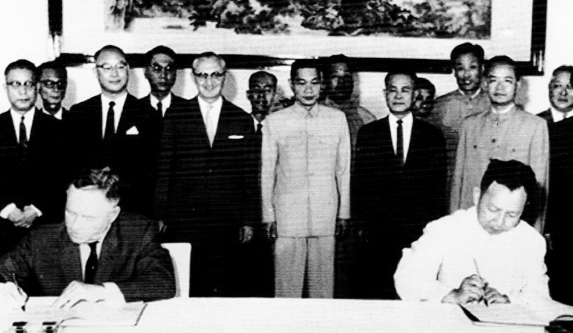
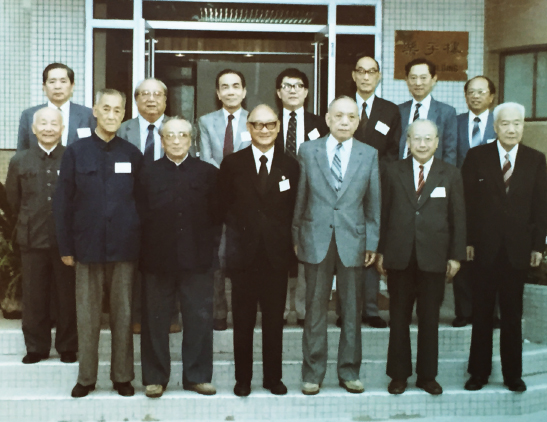
Continuing the spirit of talent cultivation
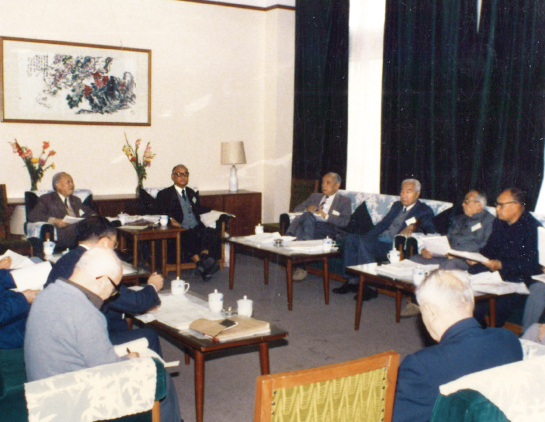 As a businessman, K C Wong had repeatedly assisted the Mainland to tide over difficulties through assumption and funding of public debts and opening of Chinese products companies. However, his far-reaching impact should be his investment of USD100 million in 1985 to set up the K C Wong Education Foundation. Laurence, who is now a director of the Foundation, pointed out that his grandfather’s topmost priority at that time was to nurture talents. “It was because education does not influence only one person, but the influence will be passed on from one person to the next and so on.”
As a businessman, K C Wong had repeatedly assisted the Mainland to tide over difficulties through assumption and funding of public debts and opening of Chinese products companies. However, his far-reaching impact should be his investment of USD100 million in 1985 to set up the K C Wong Education Foundation. Laurence, who is now a director of the Foundation, pointed out that his grandfather’s topmost priority at that time was to nurture talents. “It was because education does not influence only one person, but the influence will be passed on from one person to the next and so on.”
Laurence revealed that the Foundation will focus on funding “Belt and Road” exchanges and has started relevant projects at the Hong Kong Polytechnic University. He noted that this is in fact adhering to his grandfather’s commitment to serve as a bridge for the country’s reform and opening-up. He is grateful for the country’s special recognition for his grandfather’s contribution so many years after his death. Laurence hopes that Hong Kong people will learn more about the “Belt and Road Initiative” to make their own contribution, just as his grandfather took the lead in helping Hong Kong people understand more about the Mainland.
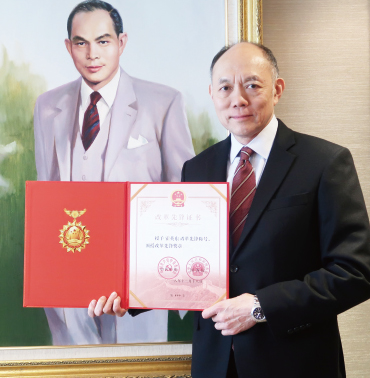
Henry Fok: Broke the ground for Mainland’s hotel industry
Reform and opening-up was a new concept in those years. For government officials and businesses, it meant they had to navigate in uncharted waters. At that time, Guangdong’s government officials were already acquainted with Chairman Henry Fok. Deeply impressed by his commitment to the country, they joined efforts with him and found a new path forward.
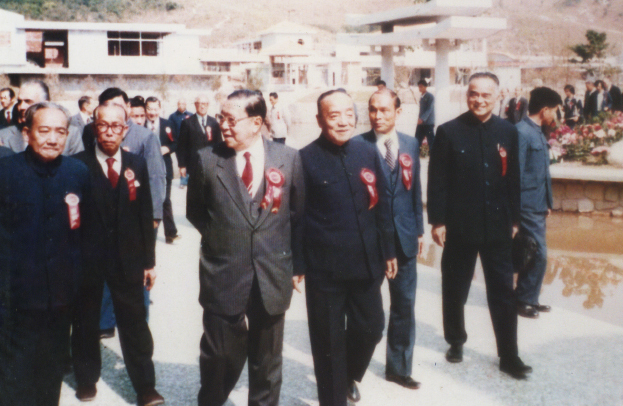
Forerunner of the Mainland’s hotel industry
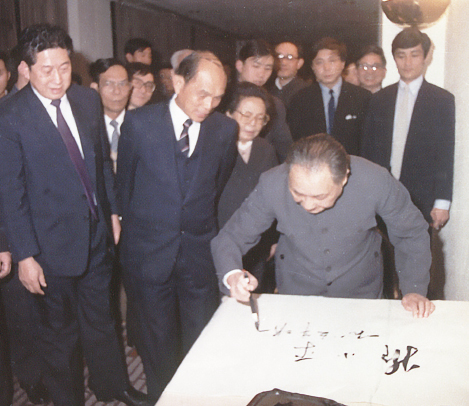 Ian Fok, the Chamber’s Life Honorary Chairman, recalled that his father began to harbour the idea of building a hotel in Yongmo, Zhongshan when hot springs were discovered there at that time. Although Yongmo was situated in a remote part of Zhongshan, Henry Fok wanted to build the hotel as soon as possible. However, given the planned economy, a popular thought among the workers at that time was “getting the same salary whether they work hard or not”, so Henry Fok offered financial incentives to encourage construction workers to work harder. In the end, the hotel was completed and commenced operation in just one year. The industrious nature of the Chinese people also impressed upon him that there was hope for the country after all. Since then, Zhongshan Hot Spring Hotel has become a symbol of reform and opening-up. Many Central Government leaders repeatedly visited the hotel, which naturally included Deng Xiaoping, the “chief architect” of China’s reform and opening-up. When he was hiking up the nearby Luosanmei Mountain, Deng said “There is no turning back now”, which is believed to be a pun on the situation of reform and opening-up.
Ian Fok, the Chamber’s Life Honorary Chairman, recalled that his father began to harbour the idea of building a hotel in Yongmo, Zhongshan when hot springs were discovered there at that time. Although Yongmo was situated in a remote part of Zhongshan, Henry Fok wanted to build the hotel as soon as possible. However, given the planned economy, a popular thought among the workers at that time was “getting the same salary whether they work hard or not”, so Henry Fok offered financial incentives to encourage construction workers to work harder. In the end, the hotel was completed and commenced operation in just one year. The industrious nature of the Chinese people also impressed upon him that there was hope for the country after all. Since then, Zhongshan Hot Spring Hotel has become a symbol of reform and opening-up. Many Central Government leaders repeatedly visited the hotel, which naturally included Deng Xiaoping, the “chief architect” of China’s reform and opening-up. When he was hiking up the nearby Luosanmei Mountain, Deng said “There is no turning back now”, which is believed to be a pun on the situation of reform and opening-up.
White Swan Hotel, the first five-star hotel in the Mainland, is another important contribution of Henry Fok. Ian pointed out that a major focus of reform and opening-up was to attract foreigners to China, but the dearth of hotels in the Mainland at that time was not only unfavourable for business operations, but also discouraged the return of overseas Chinese. Therefore, his father decided to build a modern hotel in Guangzhou, a key trading port and introduced a modern hotel management model, including the design and operation of the hotel. To enable the hotel management team understand the international standards, Henry Fok specially arranged for them to visit Hong Kong and other places to have direct experience, which was how the hotel got its “Shaolin Temple of the Hotel Industry” reputation. Ian added that his father went against all odds when he overcame the requirement for locals to obtain a referral letter from the authority before visiting the hotel, which enabled the public to visit the hotel freely to see the results of reform and opening-up.
Paving the way for the economy
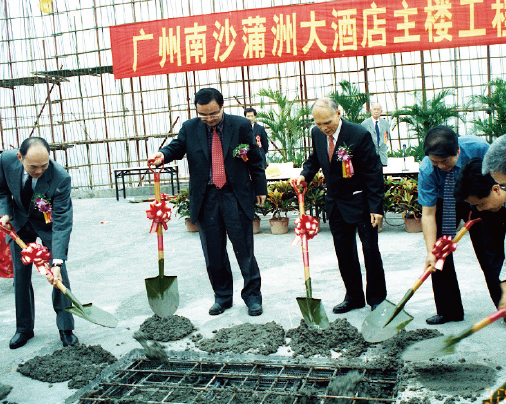 Believing that “smooth transportation paves the way to good fortune”, Henry Fok devoted great efforts to improve the Mainland’s transportation networks. As the Pearl River has an interlaced network of rivers, travelling from Macau to Guangzhou at that time had to pass through five intersections, which took a lot of time, and there were many muddy roads. In view of this, Henry Fok funded the construction of the Panyu Luoxi Bridge and suggested that the transport authority should subsidise maintenance and construction expenses through toll collection, thus laying the foundation for the transportation infrastructure needed for reform and opening-up.
Believing that “smooth transportation paves the way to good fortune”, Henry Fok devoted great efforts to improve the Mainland’s transportation networks. As the Pearl River has an interlaced network of rivers, travelling from Macau to Guangzhou at that time had to pass through five intersections, which took a lot of time, and there were many muddy roads. In view of this, Henry Fok funded the construction of the Panyu Luoxi Bridge and suggested that the transport authority should subsidise maintenance and construction expenses through toll collection, thus laying the foundation for the transportation infrastructure needed for reform and opening-up.
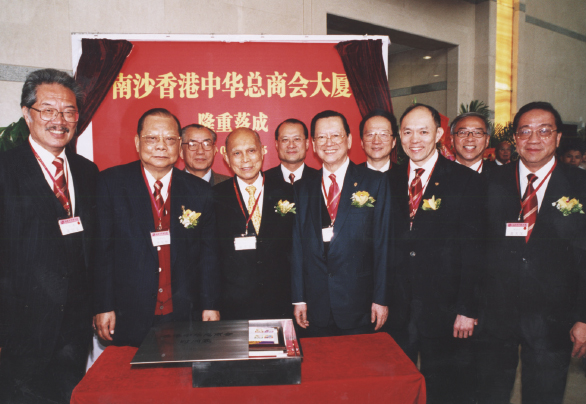
Ian believes with the new phase of reform and opening-up, the country will become more prosperous and stronger. He pointed out that Nansha, which was developed jointly by his father and the local government has been transformed into a bridge between Hong Kong and Guangzhou as well as the centre of the Guangdong-Hong Kong-Macao Greater Bay Area through two generations of operations. He said that his father strived for a one-hour life circle from Hong Kong to Nansha. With the completion of wide-ranging facilities such as transportation, housing, offices, entertainment and hotels, Nansha has already attracted investments from numerous foreign businesses. He noted that Nansha, a free-trade zone for and a national-level new district, is poised to align with the world to play a greater role in the development of the “Belt and Road Initiative” and the Greater Bay Area.
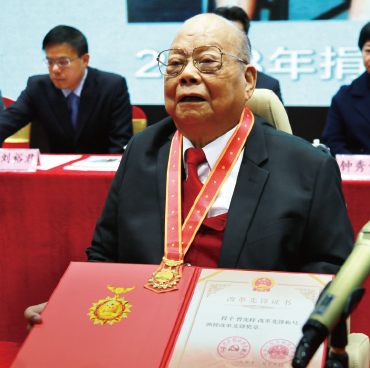
Tsang Hin-chi: Reviving hometown; entering into reform process
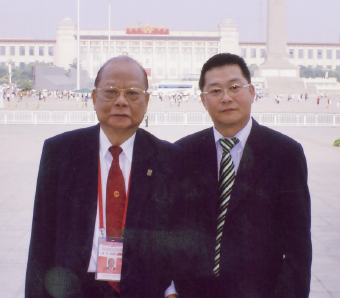 Chairman Tsang Hin-chi was one of the first persons from Hong Kong or Macau to meet with the national leader Deng Xiaoping who wanted to gather opinions from Hong Kong and Macau on reform and opening-up. Ricky Tsang, the Chamber’s Vice Chairman, said that his father had high praise for Deng’s ambitious blueprint for reform and opening-up. He was convinced that it could bring progress to the society and provide unlimited business opportunities for Chinese and foreign businesses at that time. Goldlion ties entered the Mainland market and were well received by the public as early as 1984. Tsang Hin-chi believed that since ties were relatively easy to transport, it was feasible to start a production line in the remote areas of the Mainland which was relatively backward at that time. Therefore, he decided to invest to build a factory in the Mainland.
Chairman Tsang Hin-chi was one of the first persons from Hong Kong or Macau to meet with the national leader Deng Xiaoping who wanted to gather opinions from Hong Kong and Macau on reform and opening-up. Ricky Tsang, the Chamber’s Vice Chairman, said that his father had high praise for Deng’s ambitious blueprint for reform and opening-up. He was convinced that it could bring progress to the society and provide unlimited business opportunities for Chinese and foreign businesses at that time. Goldlion ties entered the Mainland market and were well received by the public as early as 1984. Tsang Hin-chi believed that since ties were relatively easy to transport, it was feasible to start a production line in the remote areas of the Mainland which was relatively backward at that time. Therefore, he decided to invest to build a factory in the Mainland.
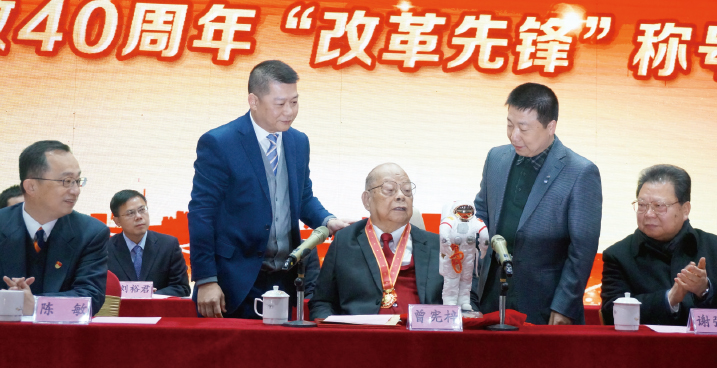
Introduction of capital and equipment to revitalize hometown
Tsang Hin-chi’s love for his hometown is well known, but Ricky mentioned that when his father first returned to his hometown, Meixian, conditions there were poor, transportation was inconvenient, and people’s livelihood needed improvement. In view of his hometown’s lag in development, Tsang Hin-chi focused on helping it make foreign exchange earnings. Hence, he invested USD1 million in Meixian in 1984 to set up Silverlion Co Ltd through a joint venture, and introduced advanced industrial technology equipment for his hometown. In addition, the factory provided a large number of employment opportunities, which improved the lives of people in Meixian.
Unremitting support for China’s foreign trade
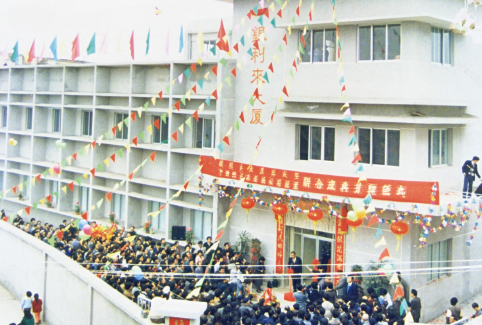 Tsang Hin-chi also gave unremitting support to the country’s foreign trade. He attended more than 60 sessions of the Canton Fair over the past three decades or so. In 2006, at the Celebration Ceremony of the 100th session of the Canton Fair, he was awarded the Certificate of Distinction in high recognition of his contribution. The entire country’s reform and opening-up cannot be achieved by one person alone. Therefore, Tsang Hin-chi also made efforts to organize Chinese entrepreneurs around the world to invest in the motherland. During his tenure as the Chamber’s Chairman, he played a pivotal role in bringing the 2001 World Chinese Entrepreneurs Convention to Nanjing. Ricky pointed out that the purpose of this move was to help global Chinese entrepreneurs understand the accomplishments of the motherland’s reform and opening-up.
Tsang Hin-chi also gave unremitting support to the country’s foreign trade. He attended more than 60 sessions of the Canton Fair over the past three decades or so. In 2006, at the Celebration Ceremony of the 100th session of the Canton Fair, he was awarded the Certificate of Distinction in high recognition of his contribution. The entire country’s reform and opening-up cannot be achieved by one person alone. Therefore, Tsang Hin-chi also made efforts to organize Chinese entrepreneurs around the world to invest in the motherland. During his tenure as the Chamber’s Chairman, he played a pivotal role in bringing the 2001 World Chinese Entrepreneurs Convention to Nanjing. Ricky pointed out that the purpose of this move was to help global Chinese entrepreneurs understand the accomplishments of the motherland’s reform and opening-up.
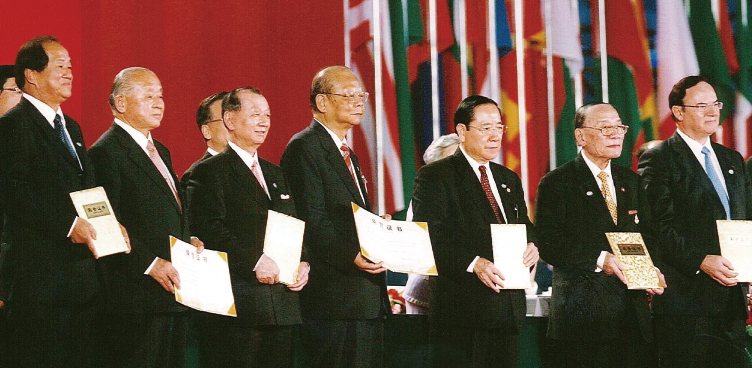
Earlier, Ricky visited Beijing on behalf of his father to receive the Reform Pioneer award. He said that his father is a staunch supporter of reform and opening-up and sincerely hopes that the country will become prosperous and strong. As the country further promotes opening-up, Ricky is convinced that Mainland will become increasingly affluent and people’s lives will become increasingly better. It will become a huge market to be developed, creating unlimited opportunities for businesses in Hong Kong and Macau, which will benefit from each other while supporting the country’s reform and opening-up. He stressed that the past 40 years of reform and opening-up have made everyone realize that the great rejuvenation of the Chinese nation requires the joint efforts of its entire people, and the honour given by the state to his father will encourage and spur him to continue making greater contributions to his hometown and the society.
Jonathan Choi: Serving the world and welcoming new opportunities
Jonathan Choi, the Chamber’s Chairman, feels deeply honoured by the country’s recognition of the Chamber’s previous chairmen. He pointed out that among the 100 persons honoured by the country, five are from Hong Kong and Macau, including three of the Chamber’s former chairmen, which is a significant proportion. It is evident that the country is very positive about the Chamber’s contributions. “This commendation is very encouraging. The Chamber and I strongly feel responsible to keep moving ahead through inheritance of the past, leading the Chamber to keep pace with the country in its new phase of reform and opening up.”
Scaling new heights with global orientation
Choi pointed out that President Xi Jinping has put forward three key development initiatives, i.e. the “Belt and Road Initiative” (B&R), the Guangdong-Hong Kong-Macao Greater Bay Area (Greater Bay Area), and RMB internationalization. They become the main focus areas of the Chamber in future. Citing an example, Choi said that the Greater Bay Area, which used to be the factory of the world, should now progress from “Made in China” to “Created in China” in order to emulate the standards of world-class urban clusters. These changes precisely show the Chamber’s direction for future development.
Expanding from serving Hong Kong, the Chamber is now geared towards serving China as well as the rest of the world. Choi believes the Chamber has accumulated valuable experience through its participation in the World Chinese Entrepreneurs Convention (WCEC) over the past two decades. Last year, the CGCC World Chinese Entrepreneurs Summit organized by the Chamber attracted the active participation of the heads of Chinese trade associations and Chinese entrepreneurs worldwide, which proves that Hong Kong definitely has the capacity to become another interaction platform for Chinese entrepreneurs globally. He hopes that the Summit will become a regular event to be held every two years. Following the establishment of the “Mainland China-Hong Kong Belt and Road Business and Professional Services Council” earlier, as its Chairman for Hong Kong, Choi looks forward to strengthening ties with Mainland enterprises via the platform to capitalize on the B&R’s opportunities together.
Towards more professionalism and cooperation with Greater Bay Area
Choi added that the Chamber will play the role of a “connector, investor, operator” in the new phase of reform and opening-up, and continue to progress towards a more diversified, professional, youthful and internationalized organization.
Looking ahead, Choi said that the Chamber will work closely with the Guangdong-Hong Kong-Macao Bay Area Entrepreneurs Union. For example, the Chamber will participate in the “Greater Bay Area Promotion Conference” in April and the World Bay Area Forum in Guangzhou in September. He said: “The Chamber will always do its part for these regional and world-class activities.”
As opportunities are always for those who are prepared, Choi advised the Chamber’s younger generation to gain insight into new economic developments on top of acquiring solid business knowledge. Coupled with a firm stance and the spirit of serving Hong Kong and the country, he believes the Chamber’s new generation will be able to capture opportunities and make contributions in the new phase of reform and opening up.




